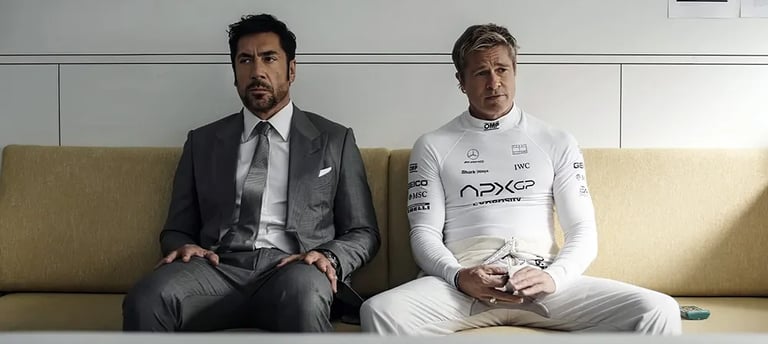“Your home for fearless film reviews, the latest entertainment news, and unfiltered movie rants.”
Brad Pitt’s F1: The Movie Becomes the Biggest Motorsport Film Ever — And Fans Can’t Stop Talking About It
Brad Pitt’s F1: The Movie races past $500M to become the biggest motorsport film ever. Real F1 footage, star power, and record-breaking box office — here’s why it’s winning.
The Tipsy Critic
8/13/2025

Brad Pitt’s F1: The Movie races past all competition to become the highest-grossing motorsport film in history. Critics are calling it authentic, exhilarating, and the best racing movie ever made.
Another sports drama, another record smashed. F1: The Movie has officially crossed the checkered flag as the most successful motorsport film of all time — overtaking Ron Howard’s Rush and setting a new benchmark for racing on the big screen.
With a mix of Hollywood star power, real Grand Prix footage, and unprecedented access to the world of Formula 1, it’s not just breaking records — it’s redefining what a motorsport movie can be.
So what exactly made it work?
A Motorsport Drama With Real Muscle
Directed by Joseph Kosinski (Top Gun: Maverick), F1: The Movie tells the story of Sonny Hayes (Brad Pitt), a veteran driver coaxed out of retirement to mentor rising star Joshua Pierce (Damson Idris) in a fictional 2025 F1 season.
What sets it apart from every racing film before it? Unprecedented realism. The cast filmed at actual Grand Prix weekends, driving modified Formula 2 cars at race pace between real sessions. Legendary F1 champion Lewis Hamiltonserved as a producer and technical advisor, ensuring the on-track sequences matched what fans see every race weekend.
Filming spanned Silverstone, Monaco, Spa, and Abu Dhabi, with real teams like Mercedes, Ferrari, and Red Bull granting pit lane access. The result? Critics say it’s “the closest you’ll ever get to driving an F1 car without risking your life.”
Performances That Go Full Throttle
Pitt delivers a grounded, charismatic turn as Hayes — part mentor, part risk-taker — while Idris is earning breakout praise for capturing both the hunger and vulnerability of a rookie in the spotlight.
The supporting cast features Kerry Condon as a sharp-tongued team principal, Javier Bardem as the sport’s cunning CEO, and a series of cameos from real F1 figures that will have fans pointing at the screen.
The chemistry between Pitt and Idris anchors the story, balancing the spectacle with genuine emotional stakes. It’s a mentor-protégé dynamic that feels earned, not manufactured.
The Audience Reaction
Fans and critics aren’t holding back — and the reactions have been overwhelmingly positive.
“The most realistic race scenes ever put to film.”
“Brad Pitt drove like he was in F1 — I forgot it was a movie.”
“Finally, a sports movie that understands the sport.”
Even long-time F1 purists — notorious for hating Hollywood’s attempts — are praising its accuracy, from the way pit stops are choreographed to how political drama unfolds behind the scenes.
Breaking Down the Box Office
At the time of writing, F1: The Movie has earned over $500 million worldwide, making it the highest-grossing motorsport film in history. It has already passed the lifetime gross of Rush (2013) and doubled that of Ford v Ferrari(2019), both of which were considered genre high points.
The film’s box office is being driven by repeat viewings, premium formats like IMAX, and strong word of mouth — a rare feat for a sports drama. Internationally, the UK, Australia, and Japan have posted huge numbers, proving that the global F1 boom is real.
The History of Motorsport on Screen
To appreciate F1’s success, you have to look at the history. Racing movies have often struggled to balance spectacle with storytelling. Grand Prix (1966) wowed audiences visually but lacked depth. Days of Thunder (1990) became a cult favorite but was more about Tom Cruise than NASCAR.
Then came Rush, which set the modern gold standard by focusing on the fierce rivalry between James Hunt and Niki Lauda. But even Rush didn’t have the access, budget, or tech that F1 enjoyed.
Kosinski’s film takes all the lessons of its predecessors — then straps a rocket engine to them.
When Authenticity Wins
One of the film’s greatest strengths is how it treats F1 like a character in itself. The sport’s danger, politics, glamour, and relentless pace are all baked into the script.
There’s no dumbing down for casual audiences — and that’s exactly why it works. The film trusts viewers to follow the jargon, understand the stakes, and appreciate the subtleties of race strategy.
Even small details — like drivers adjusting brake bias mid-corner, or mechanics communicating with coded radio messages — add layers of authenticity that F1 fans live for.
A Big Win for Sports Films
This victory isn’t just for F1. It’s a statement that sports movies can compete with superhero blockbusters if they’re made with passion and precision.
Streaming platforms and studios are already circling the idea of similar projects for MotoGP, IndyCar, and even cycling’s Tour de France. But for now, F1: The Movie stands alone as the sport’s crowning cinematic achievement.
📍 F1: The Movie is now showing in UK cinemas.
🎟️ Wanna watch it (and loads more) for FREE? Head to Cineworld Unlimited and use my exclusive referral to get an entire month of unlimited movies FREE! 👉 Use code: RAF-5JJ-47M-16X-94X when signing up here: Cineworld Unlimited – Join Now.
🔗 For more unapologetic reviews and bold movie headlines, check out my latest posts on The Tipsy Critic.
📲 Follow @thetipsycriticreview for daily takes, what’s worth watching, and the ones to skip.





As an Amazon Associate, I earn from qualifying purchases.
